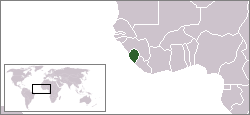Abidjan Peace Accord
| Sierra Leone Civil War |
|---|
 |
| Personalities |
| Armed Forces |
| Attempts at Peace |
| Political Groups |
| Ethnic Groups |
| See also |
The Abidjan Peace Accord was a treaty signed between the Sierra Leone People's Party (SLPP) government of Ahmad Tejan Kabbah, and the Revolutionary United Front (RUF) rebel group led by Foday Sankoh to find a resolution to the Sierra Leone Civil War. Discussions for peace began in May 1996 in the city of Yamoussoukro, and although the initial talks failed, the channels of communication had been opened. Talks continued off and on for the next six months, and on 20 November 1996, the Abidjan Peace Accord was signed in Abidjan, Côte d'Ivoire.
Goals
The accords sought out a broad range of goals:
- A National Commission for the Consolidation of Peace was to be established
- A Neutral Monitoring Group was proposed, which would consist of 700 troops
- All RUF combatants would disarm, and amnesty would be granted them
- Efforts would be made to reintegrate RUF rebels into society
- Foreign mercenary groups such as the government hired Executive Outcomes would leave the country after the establishment of the monitoring group
Results
The monitoring group did not get off the ground, and the RUF proposed it consist of only 120 monitors, and agreement could not be reached. Tensions mounted when RUF spokesmen and supporters of the Commission for the Consolidation of Peace, Fayia Musa, Ibrahim Deen-Jalloh, and Philip Palmer were accused of attempting to overthrow Sankoh as leader of the RUF. The three were interred by RUF forces, and Sankoh consolidated power in the RUF leading up to the military coup of 25 May 1997 by Johnny Paul Koroma, leader of the newly formed Armed Forces Revolutionary Council, which joined forces with the RUF. This was certainly the death knell for any hope of peace stemming from the Abidjan Accords.
Signatories
The signatories included:
- Dr. Ahmad Tejan Kabbah - President of the Republic of Sierra Leone
- Corporal Foday Saybana Sankoh - Leader of the Revolutionary United Front (RUF)
- Henri Konan Bédié - President of the Republic of Côte d'Ivoire
- Berhanu Dinka - Special Envoy of the United Nations Secretary-General for Sierra Leone
- Adwoa Coleman (M/S) - Representative of the Organization of African Unity (OAU)
- Moses Anafu (DR) - Representative of the Commonwealth Organization
External links
- Full Text of Abidjan Peace Accord, UN Peacemaker
- Text of all peace accords for Sierra Leone, UN Peacemaker